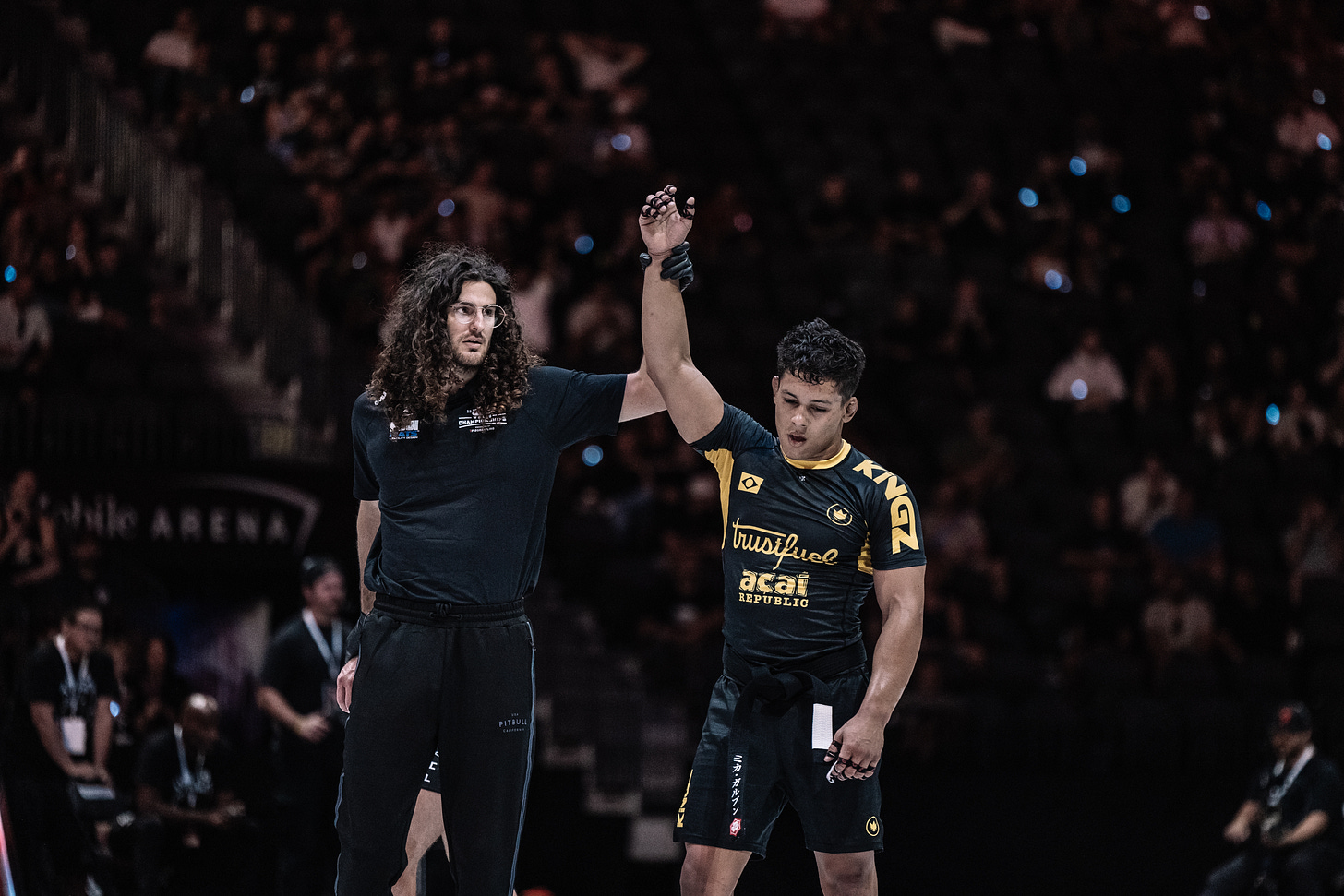Today’s post was written by Heath “The Ref” Massery. He is a Jiu-Jitsu referee best known for his resemblance to Weird Al Yankovic and his growing presence on the American ADCC circuit.
Heath has officiated at ADCC Trials, ADCC Worlds, PGF, and many other professional BJJ events around the world. To learn more about Heath or to book a lesson with him, message @HeathTheRef directly on Instagram or email heathmassery@gmail.com.

The Proactive Training Model (PTM) is a jiu jitsu instructional philosophy and training framework developed specifically for optimizing performance under ADCC rules. It challenges conventional pedagogy by focusing not on achieving victory directly, but on systematically preventing loss.
The PTM prepares athletes for worst-case scenarios and builds a sequence of strategic defenses and actions that produce consistent, high-percentage outcomes under the ADCC ruleset.
At its core, the PTM proposes that success arises from minimizing loss avenues, not from aggressively pursuing submissions or points alone. You accomplish this goal by taking a tactical approach of negating the opponent’s win conditions.
This extends the match by denying the opponent opportunities to secure a victory. By controlling match duration and trajectory, athletes can reliably force favorable outcomes, particularly through judges’ decisions.
The PTM is structured around five progressive tenets:
Submission Defense: This is the foundation. Submission is the only irreversible loss condition in jiu jitsu; therefore, the model begins by training athletes to eliminate this threat entirely. Mastery of submission defense not only prevents sudden defeat, but also builds the confidence necessary to engage freely in other aspects of the match.
Point Prevention: Once catastrophic loss is mitigated, the focus shifts to points. While losing by points is less definitive than by submission, it remains a significant threat. PTM encourages deep familiarity with the scoring system to avoid giving up points unnecessarily, reinforcing the path to favorable decisions.
Decision Victories: With strong defenses in place, the athlete is now ready to engage actively. Initiation is ADCC’s judging criteria and involves dictating the action of the match. Rather than reacting to the opponent’s moves, the athlete leads the action, making a compelling case for a decision win.
Scoring and Re-scoring: Many traditional jiu jitsu schools start here—emphasizing techniques like guard passing and positional control. PTM, by contrast, introduces this only after establishing defensive and strategic foundations. Scoring becomes more effective when the athlete is confident they won’t be countered or submitted, and re-scoring secures leads while preventing comebacks.
Submissions: Surprisingly, submissions are the final tenet. Within the PTM, they are considered a luxury—used to finish matches that are already strategically won. This counters the common mindset of pursuing early submissions, which can be high-risk and inconsistent. While submissions remain important, they are applied with intention, not as the core plan.
Limitations and Strategic Use of Submissions
While PTM emphasizes decision and point-based strategies, it recognizes the strategic value of submissions in solving two key problems: match duration and comeback potential.
Long matches can accumulate fatigue in tournament settings, and a timely submission can dramatically reduce exertion. Similarly, if trailing on points with limited opportunities to recover, a submission can flip the outcome.
Though not the focus, a strong submission game remains essential for adaptability.
About the Author
Heath began his Jiu-Jitsu journey at the University of Texas at Austin, earning a degree in linguistics and philosophy.
Known for his resemblance to Weird Al Yankovic and his growing presence on the American ADCC circuit, Heath has officiated thousands of matches, including ADCC Trials and the 2024 World Championships, despite only beginning refereeing two years ago.
Heath also contributes to smaller organizations such as Main Character Jiu Jitsu and PGF, where he led the development and revision of rulebooks.
His breadth of match experience gives him a nuanced understanding of tactics and strategy at all levels of ADCC competition.
Heath has officiated at ADCC Trials, ADCC Worlds, PGF, and many other professional BJJ events around the world. To learn more about Heath or to book a lesson with him, message @HeathTheRef directly on Instagram or email heathmassery@gmail.com.
Thank you for reading another edition of The Grappler’s Diary!
If you enjoyed reading this article, share it with friends! Or, click on the ❤️ button on this post so more people can discover it on Substack!





